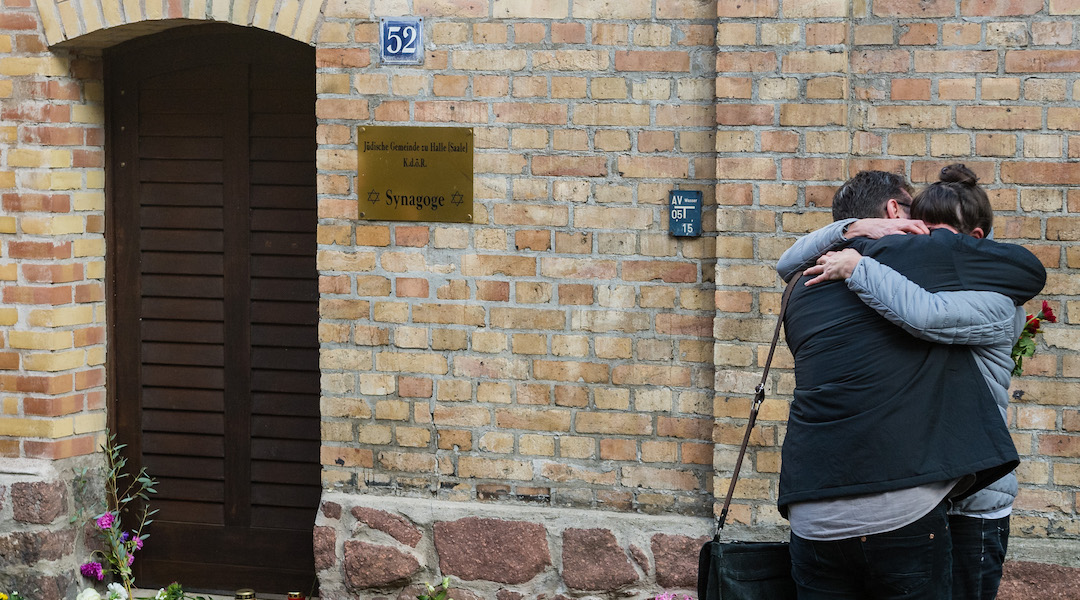What is Twitch, the site where the Germany synagogue shooter livestreamed his attack?
Published October 10, 2019
(JTA) — As Jews around the world were marking the holiest day of the year on Wednesday, news broke of an attack near a synagogue in the German city of Halle. With some 50 worshippers gathered for the Yom Kippur service, the gunman tried to enter the synagogue and, when that failed, shot a woman outside and a man at a nearby kebab shop, killing both.
A chilling detail emerged about the attack: The shooter had streamed it live online.
Users of Twitch, a streaming platform for video game enthusiasts, could watch as the gunman railed against Jews, feminism and immigrants before he shot the two victims to death. It was an eerie reminder of the killing of 51 people at two mosques in Christchurch, New Zealand, in March, which was streamed live on Facebook.
ADVERTISEMENT
German police identified the Halle suspect as 27-year-old Stephan Balliet, who lived with his mother in a nearby town.
Though the video did not remain on Twitch for long, it was captured and shared on other platforms.
Here’s what you need to know about Twitch, what makes it unique and how it compares to other sites used by extremists.

Two mourners embrace in front of the entrance to the synagogue in Halle, Germany, targeted by a gunman, Oct. 10, 2019. (Jens Schlueter/Getty Images)
What is Twitch?
Launched in 2011, the site allows users to livestream videos. It started as a spinoff of Justin.tv, named after Justin Kan, a Yale graduate who attached a camera to his hat and livestreamed his life for nine months. Three years later, their parent company, Twitch Interactive, shut down Justin.tv to focus on Twitch, which was growing rapidly. In 2014, Amazon acquired Twitch Interactive for $970 million.
Twitch, which claims to have more than 15 million daily active users, is mostly used by gamers to stream themselves playing video games. Some of the videos display the gamer’s screen as they play, while others show the player talking to the camera. There are categories for the types of games as well as a “just chatting” section, in which users can livestream themselves talking about anything. A 2017 New Yorker article reported that the most popular users can make $2 million a year streaming videos on the site.
ADVERTISEMENT
Wednesday’s shooting wasn’t the first captured on Twitch. Last year, a gunman opened fire on a crowd during a gaming tournament in Jacksonville, Florida. Though the shooting couldn’t be seen, shots and screams could be heard on the broadcast.
Twitch has also faced complaints by female gamers who said they have been harassed by the site’s mostly male user base.
How does Twitch compare to other sites used by extremists?
Far-right attackers have used a number of websites to promote themselves. Robert Bowers, the suspect in last year’s Pittsburgh synagogue shooting, used Gab to rail against Jews and immigrants. Suspects in three shootings — Christchurch, a synagogue in Poway, California, and a Walmart in El Paso — allegedly posted manifestos on 8chan, an internet forum that was taken offline in August.
But Twitch differs from those sites and similar ones, like 4chan, where loose moderation policies tend to attract extremists. The gaming site “is not inherently an extremist platform at all,” said Oren Segal, the director of the Anti-Defamation League’s Center on Extremism.
“Most of the activity on that site is for completely legitimate purposes,” Segal told the Jewish Telegraphic Agency on Thursday. “The challenge all platforms have is how they deal with that segment of users that want to exploit it for hatred, bigotry and violence.”
Twitter, Facebook and Instagram have struggled with this — and have been criticized for not doing enough to combat hateful messages on their sites.
“No matter what that platform is, extremists will find it and try to exploit it,” Segal said. “And it just underscores the broader ecosystem that needs to be addressed when approaching ways to push back against this hatred.”
How has Twitch responded?
On Wednesday, the site said it was “shocked and saddened” by the shooting and that it “has a zero-tolerance policy against hateful conduct.” Twitch said the shooting suspect streamed the attack for 35 minutes but that only about five people saw it live. A recording of the stream was viewed by around 2,200 people before it was taken down, the site said.
Though the video was removed, it had already been saved by internet users. They circulated the video on platforms popular with white supremacists: the Telegram chat app and forums like 4chan.
Rabbi Abraham Cooper, the associate dean of the Simon Wiesenthal Center, suggested that social media sites should not allow for instantaneous livestreaming. Instead, he said, they should institute a delay feature so that videos can be screened for violent content before they can be viewed.
“Extremists of all types are now incorporating the livestreaming capabilities in order to make a bigger splash, spread the terror globally, use it as a way to put yourself on the map with other extremists,” Cooper told JTA.
Why did the suspect choose Twitch?
It’s impossible to say for sure, but Segal says that gaming vernacular has become increasingly common among young violent extremists discussing violent attacks online.
“We’ve seen online spaces respond not just by glorifying the attacks, but by commenting about how the shooter killed more people than the other, or didn’t — sort of who’s going to have the highest score,” he said.
The younger demographic of Twitch users may also be appealing.
“I think naturally as gaming becomes more part of the culture more broadly, we’re seeing how that sort of gaming ideas play out within extremist spaces as well,” Segal said. “In that sense, gaming platforms may be particularly vulnerable moving forward to the exploitation from extremists”














